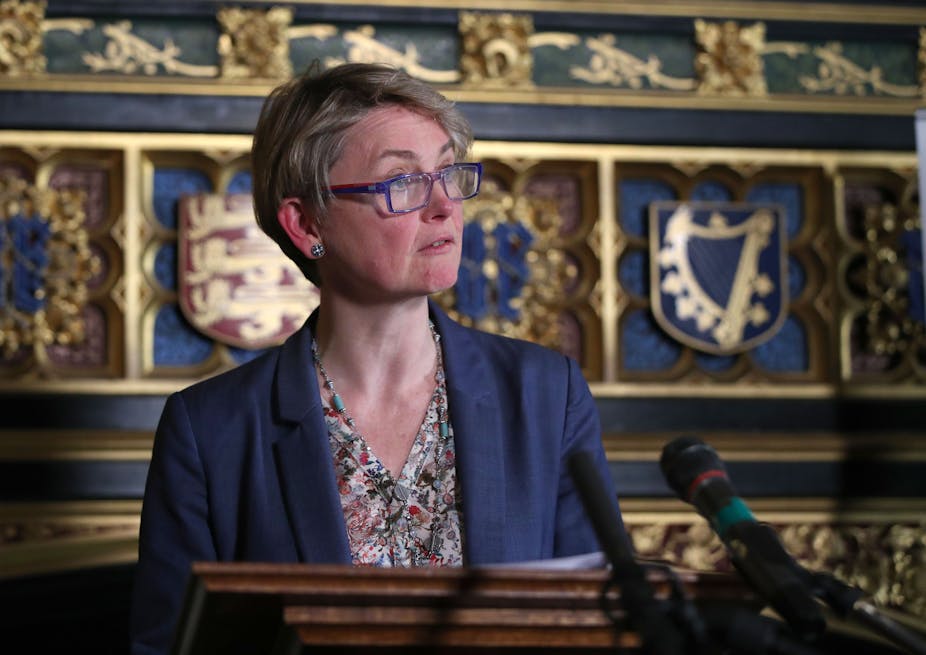As I suggested might happen in a previous article, MPs in the UK have put down amendments to the government’s finance bill to influence Brexit policy.
Amendment 7, proposed by Labour MP Yvette Cooper with Nicky Morgan, Hilary Benn and Oliver Letwin, limits the government’s powers to adjust the law about indirect taxation (for example, VAT and excise duties) after Brexit unless parliament has either agreed to a deal or voted explicitly to accept a no-deal arrangement. MPs voted 303 to 296 to pass the amendment.
More dramatically, New Clause 25, proposed by the Liberal Democrats with the support of the SNP, Plaid Cymru and the Green Party, uses the mechanism of limiting the government’s power to levy income tax and corporation tax (about 38% of government revenue), a power that needs to be renewed every year, to force the government to rule out a no-deal Brexit by default.
Currently, if parliament votes down the government’s Brexit deal, a no-deal Brexit happens automatically. Theresa May is threatening MPs that if they refuse to pass her deal, she will sit on her hands and allow no deal to happen. New Clause 25 changes the situation by linking the government’s own fate to the default option and putting all the other possible solutions to the Brexit problem, currently being excluded by the government, onto the agenda.
The government has authority to charge income tax and corporation tax only until the end of the tax year (April 5). When the House of Commons gave the finance bill a second reading on November 12 2018, under section 1 of the Provisional Collection of Taxes Act 1968 the government gained additional temporary authority to charge the two taxes, based on the budget resolutions of October 31 2018, until the end of May 2019. Section 1(5) of the 1968 Act, however, removes that temporary authority if during the passage of the bill the House rejects the provisions giving effect to it.
New Clause 25 works by eliminating the renewal of the government’s authority to charge income tax and corporation tax unless at least one of five things happens: the deal is passed, a referendum is called on revoking the Article 50 notice, the Article 50 notice is revoked without a referendum, the government asks for an extension to the Article 50 process, or the House of Commons passes a motion approving a no-deal exit.
What can the government do?
If New Clause 25 were to be selected for debate by the Speaker and passed by the House, the government would have a limited range of options. It could still propose its deal, but if the deal loses, the government would need openly to adopt a new policy. It could try to persuade parliament to approve a no-deal exit, but all the indications are that MPs would reject no deal. At that point, to retain its authority to levy direct taxes, it would need rapidly to shift to holding a new referendum or asking for an extension to the Article 50 process (in all probability those options would go together) or revoking the Article 50 notice without a referendum.
The government might also try the extension option by itself, seeking an extension merely to implement a no-deal exit. However, even that option needs parliamentary endorsement since the parallel domestic legal change, altering the date of exit away from March 29 2019, cannot be done without an affirmative resolution of the House.
Could the government simply ignore the vote? In theory it could propose another budget, although that might fall foul of the rule that the House may not decide the same question twice in a session. It could try asking the Queen to end the parliamentary session. That, though, would itself end the government’s temporary authority to levy taxes.
Even in a new session, the government would find it difficult to get its budget resolutions passed before March 29. It might have a better chance of getting a second budget through after the UK leaves the EU but it would have only a few days to do that, given that ending the parliamentary session early would have terminated the extension of temporary authority to the end of May.

Cooper’s amendment has a smaller effect, concerning only adjustments to the relevant taxes rather than authority to collect them at all, but the mechanism is the same. It can be complied with only by passing the deal or letting the House of Commons vote for no deal or the government asking for an extension. The idea is that since the referendum option cannot in practice be achieved without asking for an extension and the immediate revocation option would end any need for the clause itself, those options are covered by implication.
The media reports about these amendments have said that they parallel events in the US, in particular the federal government shutdown. This is not accurate. The US situation arises out of a refusal to pass authorisations to spend. The equivalent UK bills were passed in March 2018 and bills authorising spending in the next financial year have not yet been proposed. The UK situation concerns not authority to spend but authority to tax. The amendments do not shut down any UK government services, but they do undermine the government’s ability to pay for its spending out of taxation.

